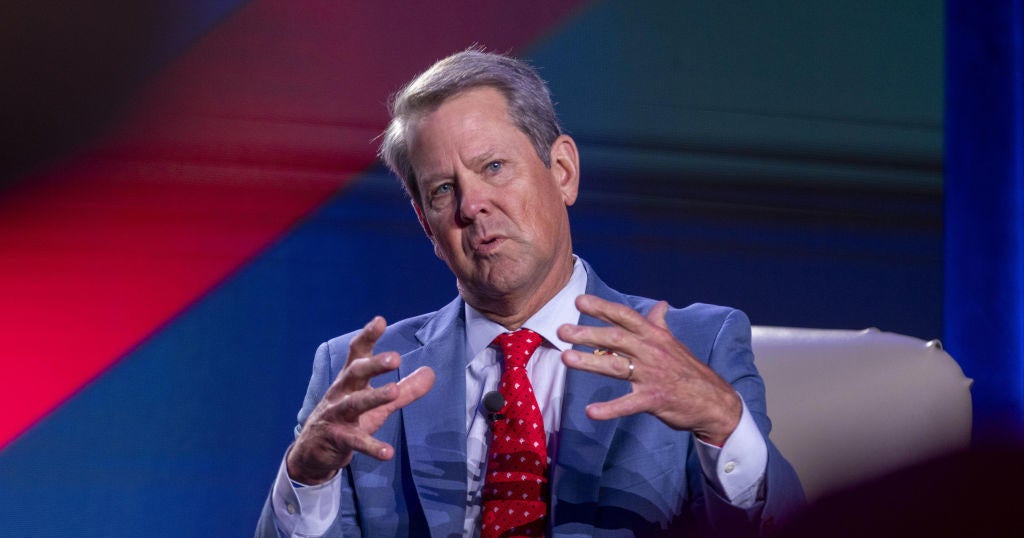In a significant political development, Georgia Governor Brian Kemp has announced that he will not be seeking the Republican nomination for next year’s highly anticipated U.S. Senate race in Georgia. This race is expected to be pivotal in determining the balance of power in Congress, especially in the Senate, where Republicans are currently vying to unseat the incumbent Democratic Senator Jon Ossoff.
Governor Kemp’s decision came as a surprise to many who considered him a prime candidate for the seat. In a statement released on his social media profile on the platform formerly known as Twitter, now called X, Kemp cited personal and familial reasons for his withdrawal. He mentioned, “Being on the ballot next year is not the right decision for me and my family.” This announcement underscores the often personal and strategic calculations that factor into decisions of such magnitude.
Prior to making his decision public, Governor Kemp had multiple discussions with key figures in the Republican Party, including Senate GOP leadership and former President Donald Trump. During these conversations, Kemp expressed his earnest desire to support the party’s efforts in ensuring that a strong Republican candidate is positioned to contest and win in the upcoming elections. This marks a collaborative approach in strengthening the party’s prospects, despite his personal step back from candidacy.
Kemp’s significance as a potential candidate stems not only from his gubernatorial track record but also from his electoral popularity in Georgia—a state that has recently exhibited highly competitive political dynamics. Observers of Georgia politics will recall that Kemp maintained a narrow but clear lead over Ossoff in a hypothetical matchup according to a poll conducted by the Atlanta Journal-Constitution. The poll revealed Kemp ahead by a margin of 49%-46%, a statistical tie within the poll’s margin of error.
Georgia’s political landscape has been notably tight in recent electoral cycles. For instance, Ossoff secured his Senate seat in a close 2021 runoff, winning by just under two percentage points against former Republican Senator David Perdue. This victory was critical in achieving a narrow Democratic majority in the Senate. Additionally, the state saw another closely-contested Senate race in 2022 when Democratic Senator Raphael Warnock was re-elected against Trump-backed candidate Herschel Walker by a slim margin of fewer than three points.
Despite these competitive edges and previous victories, Kemp’s withdrawal places the Republican Party in a position where they must now identify and support another candidate who can consolidate the GOP base and appeal to the broader electorate of Georgia. The state’s shifting demographics and political orientation, portraying a move from a traditionally red state to a more fiercely contested battleground, add layers of complexity to this task.
Complicating the political equation further is Kemp’s historically tense relationship with former President Trump, especially following the 2020 election. Trump had harshly criticized Kemp for his handling of the election integrity issues Trump raised following his loss. Despite these strains, Kemp later endorsed Trump’s 2024 presidential campaign, which illustrates the intricate alliances and rifts within the GOP.
In light of Kemp’s decision, all eyes are on potential Republican candidates who might enter the race. High-profile figures such as Georgia Representative Marjorie Taylor Greene have been discussed as possible contenders. Greene has indicated she is considering her options for higher office, which could include this Senate race. However, polling suggests she would face significant challenges; a recent head-to-head matchup poll showed her trailing significantly behind Ossoff.
Ultimately, the road to the Republican nomination and the subsequent general election is expected to be highly competitive and strategically vital for both parties. Senator Ossoff’s campaign is likely to capitalize on the current scenario, aiming to bolster their position and fend off whichever Republican challenger emerges. The campaign’s manager, Ellen Foster, conveyed confidence post-Kemp’s announcement, stating, “As Republicans scramble in the aftermath, our campaign will continue to build insurmountable momentum needed to win next November.”
This unfolding scenario encapsulates the fluidity and unpredictability of political races and strategies, particularly in battleground states like Georgia where the stakes are incredibly high. As the Republican Party regroups to find their nominee, the forthcoming months are poised to be filled with strategic maneuverings and intense campaigning as both parties strive for victory in what will undoubtedly be one of the most closely-watched Senate races in the 2024 electoral cycle.









